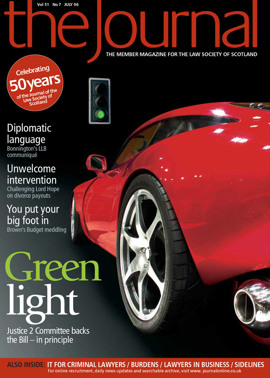Switching channels

Contrary to the prejudices expressed by Sir Alan Sugar and other like-minded business leaders, there is ample evidence to suggest that lawyers can in fact transfer their skills and be a success in businesses beyond legal practice.
Lawyers were of course traditionally known as men of business, so it is a puzzle why solicitors are now so often pigeonholed as lacking business acumen.
Cameron: oiling the wheels
Perhaps the best current example of a Scottish solicitor flourishing in business is Henry Cameron.
Before devoting his full time attention to the oil sector, Cameron founded and was senior partner of Aberdeen firm Peterkins. Through involvement with clients in the former Soviet Union, Cameron acquired a rare working knowledge of doing business in Russia. In 1989 he assumed control of the Pentex Oil group of companies, which in turn led to the creation of Sibir Energy plc. In recent months Cameron has been in the news for his dispute with Russian oligarch Roman Abramovich over “missing” shares in a Siberian oilfield venture.
He suggests that not all lawyers are capable of working in business, but that many have an entrepreneurial instinct that makes them more than able to make the transition and, after time, add to their existing skills to become leaders of industry. This is especially so for those lawyers who have a good understanding of accounting and financial matters.
“Those who are capable of the transition bring an ability to analyse business problems and articulate solutions, and in a manner understandable to their audience. Management in business is about judgment and taking the right decisions. The lawyer’s knowledge of how the law works in practice helps them judge the business big picture, find solutions quickly and give sensible direction to the business.”
A lawyer’s ability to stay cool in stressful situations can be advantageous in business, says Cameron.
“A lawyer can bring stability to the business when it needs it most. It also means they have good people skills – an essential in business. They are no strangers to hard work and long hours – another essential in business. Their professional training and practice teaches them a sense of fairness which helps shape the culture of the business, which in turn influences the others in the business. Having had to handle clients’ funds, they have already developed a keen sense of accountability, invaluable in dealing with shareholders. In addition to fulfilling a commercial role, the lawyer provides a comfort factor for colleagues who can get a ready answer to many problems. It is a pity that more lawyers don’t make the transition. Business would be the better for their presence.”
It is evident to anyone with any knowledge of business that being a successful businessman is nothing to do with qualifications, observes Cameron.
“The lawyer when he turns to business will however bring an additional dimension. To exclude the lawyer because of his qualifications is to ignore a human resource.”
Mackie: frozen assets
Former conveyancer Mac Mackie is managing director of Mackie’s Ice Cream. He insists that the key to success in business is common sense and that good lawyers can go far in business. With the experience of running a legal practice and pitching for clients, there is no reason why these skills cannot transfer to a wider community.
“I think most lawyers if they got the opportunity would find they had all the necessary skills required to flourish in business. Lawyers are generally quick on the uptake, and well used to lots of things being thrown across their desks at one time. A firm understanding of finances is important, and running a smaller business like ours you also have to have a grasp of HR and sales. Logically, lawyers are bright people who have worked hard and gone through a fairly intensive training, so it’s always likely they will do well in business if given the chance.”
Having completed an MBA as well as legal training, Mackie suggests there is no more direct transfer of skills from the theory of the MBA to business, as there was from his short time in legal practice.
“There is a prejudice against lawyers. People don’t like lawyers and businesses will be more likely to take a chance on accountants because they can see the direct transfer of skills. But lawyers are used to finding solutions to problems and that’s an important skill in business.”
O’Dowd: media presence
Bishops’ Mark O’Dowd has followed the opposite path. Prior to becoming a solicitor he ran (and still does) media communication and property businesses. He always believed that becoming a solicitor would enhance his skills both as a communicator and a businessman.
For O’Dowd, answering the question, why is it that people who are taught how to analyse communications of all kinds and whose business relies so heavily on those communication skills are so poorly perceived as lacking those very skills, may be key to determining the attitude of Sugar and others.
“Historically lawyers always understood and successfully ran businesses, and more recently there has been a resurgence of entrepreneurial lawyers. You only have to look at the largest UK legal business Clifford Chance, which turned over almost £1bn last year, to see that being a good lawyer doesn’t make you a bad entrepreneur.”
O’Dowd observes that lawyers have fantastic transferable skills, and are experts at thinking clearly and logically to solve problems “in the box”, both attributes which should allow them to excel in business. However, in practice, many lawyers fail to grasp the basics of relationship management or empathy, or even to realise that their skills are, indeed, transferable.
“This is what Sir Alan Sugar implicitly identified and what allowed him to easily dismiss our skills, further promoting the stereotype which has dominated our industry for many years now.
“This preoccupation with one skill is to the detriment of the others. Achievement is measured solely by intellectual quotient (IQ) and rote learning skills, rather than combining these skills with emotional quotient (EQ) and visual literacy skills.
“So what Karen Bremner, like many lawyers, lacked in the boardroom situation was the ability to rationalise the context of the situation she found herself in. She was on a car crash TV show whose sole purpose is to entertain and promote Alan Sugar and his companies. This type of TV needs freaks and flawed characters who can be saved and repaired by the champion, Sir Alan.
“If Karen’s EQ skills were as evident as her obvious dignity, decency, calmness and ability to analyse and rationalise logical communication, she would have understood how to respond to Sir Alan’s needs in that situation. She would have been better able to read the signs Sir Alan was giving out, she would have been better able to realise how the situation looked to the viewers and she would have consolidated her position by building on her strengths.”
Nevertheless, O’Dowd says that as an industry the profession is learning and improving to enable it to respond better to the challenges of the legal market.
“As for Karen, I am convinced that she will channel the experience gained from the context in which she had to operate, and the exposure which the show provided into her EQ skill set, and go on to flourish.”
Roger Mackenzie is an assistant with the Elizabeth Welsh Family Law Practice, Prestwick, and a former deputy editor of the Journal
In this issue
- Challenging times
- A block on service
- Revving up for debate
- LLB confidential
- Clean break under attack
- The hokey-cokey Chancellor
- Switching channels
- The Chancellor gets it REIT
- Executries sponsored feature
- The EU and the criminal
- Case for the defence
- To act or not to act... that is the question!
- A summary matter
- Ireland 4, Italy 0
- The route ahead
- Scottish Solicitors Discipline Tribunal
- Website reviews
- Book reviews
- Is that burden dead yet?






